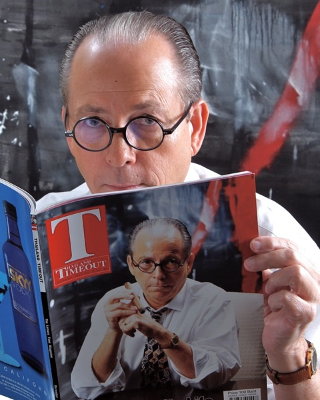Expat Interview – Jake Needham
In our Expat Interview series, we talk to expats all over the world who are involved in doing something which our readers would be interested in hearing more about. It could be work, running a business, or involvement with a charity.
 Today’s interviewee is Jake Needham, a US citizen who first visited Bangkok in 1970 and has been living on both sides of the Pacific since 1982 – first as an international lawyer, then as a screenwriter, and now as a novelist. In 1999, he published his first novel, The Big Mango, to immediate acclaim. His two series of novels written since then featuring Jack Shepherd (set largely in Thailand, Hong Kong and Macau) and Inspector Samuel Tay (set in Singapore) have both built up avid followings, with sales in the hundreds of thousands. He and his family now divide their time between homes in the US and Thailand.
Today’s interviewee is Jake Needham, a US citizen who first visited Bangkok in 1970 and has been living on both sides of the Pacific since 1982 – first as an international lawyer, then as a screenwriter, and now as a novelist. In 1999, he published his first novel, The Big Mango, to immediate acclaim. His two series of novels written since then featuring Jack Shepherd (set largely in Thailand, Hong Kong and Macau) and Inspector Samuel Tay (set in Singapore) have both built up avid followings, with sales in the hundreds of thousands. He and his family now divide their time between homes in the US and Thailand.
On being an expat:
BE: There was a time when an expat was regarded as someone adventurous and possibly even a little eccentric. These days it sometimes seems as if most people think of it as just another career or retirement option. Has the romance gone out of the expat lifestyle?
Jake Needham: The British view and the American view on expat life are quite different. We have no expat tradition in the US and the whole concept of living in another country seems quite strange to most Americans.
I’ve written four novels about a lawyer named Jack Shepherd who, on something of a whim, left his partnership in a prominent Washington DC law firm to take a job teaching international finance in the business school at Chulalongkorn University in Bangkok. This is what Shepherd said about becoming an expat:
When people in Washington first began to hear that I was leaving to live in Bangkok and teach at Chulalongkorn University, a few of them jumped to the conclusion I was making a point of some kind, abandoning the land of my birth for reasons that were probably political and no doubt wacky. Others who heard what I was doing—and I noticed this group seemed to be composed mainly of women—attributed my change of address to middle-aged male angst fueled by overly moist fantasies of slim, submissive Thai women serving me brightly colored tropical drinks with little umbrellas in them. Most people, of course, fell into neither of those categories. Most people just assumed that I had lost my damned mind.
Part of the problem was that the whole idea of living in a foreign country was just so strange to most Americans, particularly since very few of them had ever seriously entertained the thought, however fleetingly, themselves. After all, everyone wanted to come to America, didn’t they? Half the population of the earth was fighting to live in Orange County and work in a 7-Eleven, wasn’t it? Why in God’s name would an American even think of living anywhere else?
I suppose it sounds like a joke to say so, but most Americans don’t even understand the meaning of the word ‘expatriate’. I can’t tell you how many people I’ve met who think the world is actually spelled ‘ex-patriot’, and means someone who used to be a patriot but is no longer.
How is it different to be an expat these days than it was when you started living in Asia in the ’80s?
I think it’s vastly different in the most fundamental sense. It’s largely irrelevant to everyone where you actually are any more. You communicate constantly with people without your location mattering in the slightest. Back in the dark ages when people made telephone calls and sent faxes, people had to know exactly where you were in order to reach you, and frequently it was difficult and expensive to do so. But with social networks and email, your location doesn’t matter in the slightest and people can reach you whenever they wish with no trouble and at virtually no cost. They communicate with you exactly the same way whether you are in New York or Vladivostok. Not only do they frequently not know where you are, generally they don’t care.
When I was involved with corporate acquisitions in Asia in the ’80s and ’90s, your physical location was everything. Documents had to get to you by fax or courier, people needed to know exactly how to reach you by telephone all the time, and you spent an inordinate amount of your life relaying schedules and telephone numbers and fax numbers and locations and time zones to others so that they would know how to reach you. God help you if you ended up staying in a hotel where you hadn’t planned to be or going to a city you had no intention of visiting because then you had to start all over with the whole list until everyone you were dealing with knew where and when they could reach you. It’s almost impossible to conceive of now, isn’t it?
| Forward to Page 2 |

Leave a Reply